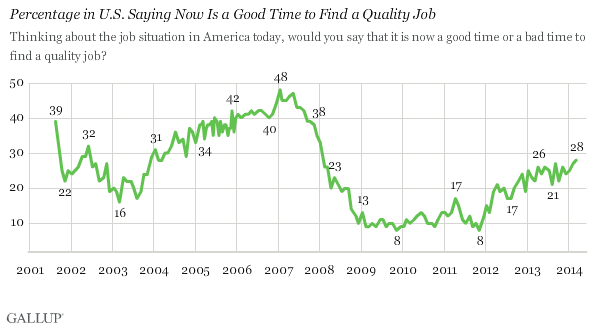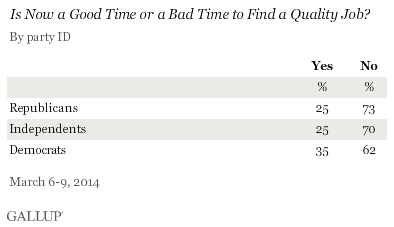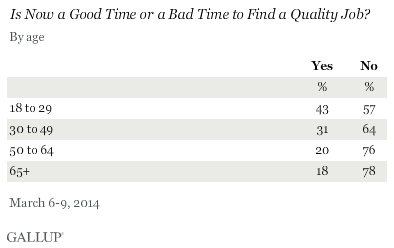PRINCETON, NJ -- Americans' perceptions that now is a good time to find a quality job continue to inch up, but remain far less positive than they were before the 2008-2009 recession. Gallup's March reading finds that 28% of Americans say now is a good time to find a quality job, up from 27% in February, and now the highest reading on this measure since January 2008.

Americans' outlook for quality jobs -- as well as several other core state-of-the-nation indicators -- are tracked monthly as part of the Gallup Poll Social Series. The latest update is based on Gallup's March 6-9 survey.
One can take a positive or negative historical view of the current 28% who say it's a good time to find a job. The good news: the current reading reflects a continuing, but slow rise from the all-time lows of 8% recorded in November 2009 and November 2011, and is now the highest reading since January 2008.
The not-so-good news is that the 28% figure is low on an absolute basis, and low compared with where it was in the mid-2000s. On the first point, when two-thirds of the population says it is a bad time to find a quality job, this clearly does not describe an optimal economic environment. The most positive levels Gallup has recorded on this measure since 2001 were in January 2007 -- when 48% said it was a good time, and 47% a bad time to find a good job -- a year or more before the full effects of the banking crisis and recession began to be evident.
Those who are in the workforce -- currently employed, or unemployed and looking for work -- are a bit more positive about the job market than the broader U.S. population, with 31% saying it is a good time to find a quality job.
Americans' political persuasion affects their views of the job market, as it has to varying degrees over the past 13 years. Republicans were substantially more positive than Democrats during most of George W. Bush's presidency, and Democrats are now the most positive with Barack Obama in the White House, although the gap between parties is not nearly the same as it was under Bush. In this latest poll, 25% of both Republicans and independents say it's a good time to find a quality job, contrasted with 35% of Democrats.

Younger Americans have in recent years been most positive about the job market, while older Americans have been the least positive. In the most recent survey, more than four in 10 18- to 29-year-olds say it's a good time to find a quality job, contrasted with no more than one in five of those 50 and older.

Although job prospects may be better among those with higher education, those who have postgraduate education are actually less positive about the job market than those having less education, with only 20% of the former group saying it's a good time to find a quality job.
Implications
Americans now rate unemployment, along with dysfunctional government and the economy in general, as the most important problems facing the country. The data reported here, showing that fewer than three in 10 Americans say it is a good time to find a quality job, reinforce the public's decidedly negative views of the jobs situation today.
It has been more than five years since the full effect of the banking crisis and recession hit the nation's economy. While perceptions of the job market have certainly improved from their nadir in 2009 and 2011, when only 8% thought it was a good time to find a quality job, they are nowhere near where they were prior to the recession and -- based on research conducted by others -- are far behind the levels seen during the last economic "good times" in this country, during the dot-com boom of the late 1990s. This measure of the average American's view of the job market will provide an excellent barometer of economic progress going forward.
Survey Methods
Results for this Gallup poll are based on telephone interviews conducted March 6-9, 2014, with a random sample of 1,048 adults, aged 18 and older, living in all 50 U.S. states and the District of Columbia.
For results based on the total sample of national adults, the margin of sampling error is ±4 percentage points at the 95% confidence level.
Interviews are conducted with respondents on landline telephones and cellular phones, with interviews conducted in Spanish for respondents who are primarily Spanish-speaking. Each sample of national adults includes a minimum quota of 50% cellphone respondents and 50% landline respondents, with additional minimum quotas by time zone within region. Landline and cellular telephone numbers are selected using random-digit-dial methods. Landline respondents are chosen at random within each household on the basis of which member had the most recent birthday.
Samples are weighted to correct for unequal selection probability, nonresponse, and double coverage of landline and cell users in the two sampling frames. They are also weighted to match the national demographics of gender, age, race, Hispanic ethnicity, education, region, population density, and phone status (cellphone only/landline only/both, and cellphone mostly). Demographic weighting targets are based on the most recent Current Population Survey figures for the aged 18 and older U.S. population. Phone status targets are based on the most recent National Health Interview Survey. Population density targets are based on the most recent U.S. census. All reported margins of sampling error include the computed design effects for weighting.
In addition to sampling error, question wording and practical difficulties in conducting surveys can introduce error or bias into the findings of public opinion polls.
View survey methodology, complete question responses, and trends.
For more details on Gallup's polling methodology, visit www.gallup.com.